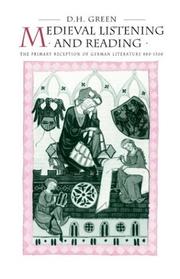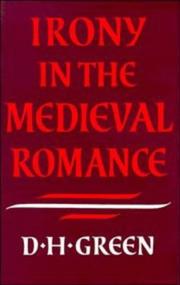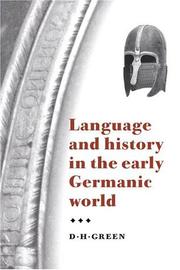| Listing 1 - 10 of 20 | << page >> |
Sort by
|

ISBN: 0521444934 0521020883 0511518722 0511834152 9780521444934 9780511518720 9780521020886 Year: 1994 Publisher: Cambridge Cambridge University Press
Abstract | Keywords | Export | Availability | Bookmark
 Loading...
Loading...Choose an application
- Reference Manager
- EndNote
- RefWorks (Direct export to RefWorks)
This new study brings recent scholarly debates on oral cultures and literate societies to bear on the earliest recorded literature in German (800-1300). It considers the criteria for assessing what works were destined for listeners, what examples anticipated readers, and how far both modes of reception could apply to one work. The opening chapters review previous scholarship, and the introduction of writing into preliterate Germany. The core of the book presents lexical and non-lexical evidence for the different modes of reception, taken from the whole spectrum of genres, from dance songs to liturgy, from drama and heroic literature to the court narrative and lyric poetry. The social contexts of reception and the physical process of reading books are also considered. Two concluding chapters explore the literary and historical implications of the slow interpenetration of orality and literacy.
German literature --- Oral tradition --- History and criticism --- 830 "04/14" --- 930.85:02 --- 82.085.43 --- -German literature --- -Oral tradition --- -Civilization, Medieval, in literature --- Tradition, Oral --- 82.085.43 Literaire receptie --- Literaire receptie --- 930.85:02 Cultuurgeschiedenis. Kultuurgeschiedenis-:-Bibliotheekwezen --- Cultuurgeschiedenis. Kultuurgeschiedenis-:-Bibliotheekwezen --- 830 "04/14" Duitse literatuur--Middeleeuwen --- Duitse literatuur--Middeleeuwen --- Civilization, Medieval, in literature. --- History and criticism. --- Civilization, Medieval, in literature --- Oral communication --- Folklore --- Oral history --- anno 500-1499 --- Littérature allemande --- Tradition orale --- Histoire et critique --- Old High German, 750-1050 --- Middle High German, 1050-1500 --- Germany --- German literature - Old High German, 750-1050 - History and criticism. --- German literature - Middle High German, 1050-1500 - History and criticism. --- Oral tradition - Germany. --- Arts and Humanities --- Literature --- German literature - Middle High German, 1050-1500 - History and criticism --- Oral tradition - Germany --- German literature - Old High German, 750-1050 - History and criticism

ISBN: 0521224586 0521022169 0511519516 0511826362 Year: 1979 Publisher: Cambridge
Abstract | Keywords | Export | Availability | Bookmark
 Loading...
Loading...Choose an application
- Reference Manager
- EndNote
- RefWorks (Direct export to RefWorks)
Despite the fashionable standing of irony in studies of modern literature and its occasional application to medieval studies in a number of recent works, no sustained analysis of this phenomenon has yet been attempted for medieval literature. Professor Green attempts to fill the most important part of this lacuna by discussing irony in the medieval genre in which it is employed most frequently and with the greatest sophistication, the romance. The approach is therefore directed more towards the genre as such than to any specific example, and, although the book is written primarily from a Germanist's point of view, it also takes into account the romances of Chrétien de Troyes and their German adaptations, various examples from the Tristan tradition in France and Germany, Flamenca as an example from Provence, as well as Chaucer's Troilus and Criseyde, and Sir Gawain and the Green Knight from England. Proceeding from a working definition of medieval irony and a survey of the signals which may allow us to perceive its presence, Professor Green considers the possibilities, rhetorical and otherwise, of registering irony in courtly literature at large. From this he moves on to discuss the major themes to which irony may be applied (chivalry and love), as well as the ways in which the narrative is organised so as to bring out any ironic implications of these themes. Subsequent chapters are concerned with the various types of irony to be distinguished: verbal irony, irony of the narrator, dramatic irony, the irony of values, and structural irony. A concluding chapter sums up the reasons, aesthetic and social, for the prevalence of irony in this particular genre of medieval literature.
Irony in literature --- Romances --- -Chivalric romances --- Chivalry --- Courtly romances --- French romances --- Medieval romances --- Romances, French --- Romans courtois --- French literature --- Literature, Medieval --- History and criticism --- -Irony in literature --- European literature --- Medieval literature --- Fiction --- Comparative literature --- anno 1200-1499 --- Chivalric romances --- Irony in literature. --- History and criticism. --- Arts and Humanities --- Literature --- Medieval romance

ISBN: 0521471346 Year: 2000 Publisher: Cambridge Cambridge University press
Abstract | Keywords | Export | Availability | Bookmark
 Loading...
Loading...Choose an application
- Reference Manager
- EndNote
- RefWorks (Direct export to RefWorks)
803 --- 940.1 --- 940.1 Geschiedenis van Europa: Middeleeuwen:--(ca.375-1492) --- Geschiedenis van Europa: Middeleeuwen:--(ca.375-1492) --- 803 Germaanse taalkunde --- Germaanse taalkunde --- Germanic languages --- -Germanic tribes --- -Languages in contact --- Teutonic languages --- History --- Europe --- -Council of Europe countries --- -Germanic languages --- Germanic peoples --- Languages in contact --- Areal linguistics --- Rome --- History.

ISBN: 0521245001 0521020743 0511519524 Year: 1982 Publisher: Cambridge Cambridge University Press
Abstract | Keywords | Export | Availability | Bookmark
 Loading...
Loading...Choose an application
- Reference Manager
- EndNote
- RefWorks (Direct export to RefWorks)
Although much work has recently been done on the relationship between poet, narrator and audience in medieval literature, no sustained attempt has yet been made to inquire into the ways in which the listener's responses are rhetorically controlled and guided in the case of the Parzival of Wolfram von Eschenbach. This book attempts such an inquiry by combining five approaches which have so far been used only separately or partially: the narrator's use of a point of view technique, a specific problem concerning the medieval technique, a specific problem concerning the medieval reception of his work, a procedure best described as 'revealing while concealing', the technique used in naming characters, and the theme of recognition in Parzival. These approaches are combined and applied in detail to the narrative sequence of Wolfram's romance. Although the narratives dealing with Gahmuret, Parzival and Gawan are all dealt with, the lion's share falls to Parzival as the hero of the work (whereby special importance is attached to his crucial dialogue with the hermit Trevrizent in Book IX), but due regard is also paid to Gawan as a means of highlighting the special position of the hero. The discussion throughout is organised around the various encounters in the work in which recognition or non-recognition plays a part.
Fiction --- Thematology --- Percival [Fictitious character] --- Wolfram von Eschenbach --- Perceval en prose --- Arts and Humanities --- Literature --- Arthurian romances --- Civilization, Medieval, in literature. --- Knights and knighthood in literature. --- Recognition in literature. --- History and criticism. --- Wolfram, --- Perceval --- Romances --- Percival --- Parzifal --- Parzival --- Parsifal --- Peredur --- Parsival --- Perleuaulx --- Perlevaulx --- Perlesvaus
Book
Year: 1965 Publisher: Cambridge : Cambridge university press,
Abstract | Keywords | Export | Availability | Bookmark
 Loading...
Loading...Choose an application
- Reference Manager
- EndNote
- RefWorks (Direct export to RefWorks)
Book
Year: 1966 Publisher: Cambridge : Cambridge university press,
Abstract | Keywords | Export | Availability | Bookmark
 Loading...
Loading...Choose an application
- Reference Manager
- EndNote
- RefWorks (Direct export to RefWorks)
Book
ISBN: 3525855486 Year: 1974 Publisher: Göttingen : Vandenhoeck und Ruprecht,
Abstract | Keywords | Export | Availability | Bookmark
 Loading...
Loading...Choose an application
- Reference Manager
- EndNote
- RefWorks (Direct export to RefWorks)
Book
ISBN: 0521794234 Year: 2000 Publisher: Cambridge Cambridge university press
Abstract | Keywords | Export | Availability | Bookmark
 Loading...
Loading...Choose an application
- Reference Manager
- EndNote
- RefWorks (Direct export to RefWorks)
Book
ISBN: 0521174376 9780521174374 Year: 2011 Publisher: Cambridge: Cambridge university press,
Abstract | Keywords | Export | Availability | Bookmark
 Loading...
Loading...Choose an application
- Reference Manager
- EndNote
- RefWorks (Direct export to RefWorks)
Women --- Women and literature --- Women --- Women and literature --- Women --- Women and literature
Book
Year: 1980 Publisher: Cambridge University Press
Abstract | Keywords | Export | Availability | Bookmark
 Loading...
Loading...Choose an application
- Reference Manager
- EndNote
- RefWorks (Direct export to RefWorks)
| Listing 1 - 10 of 20 | << page >> |
Sort by
|

 Search
Search Feedback
Feedback About UniCat
About UniCat  Help
Help News
News